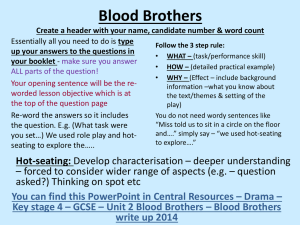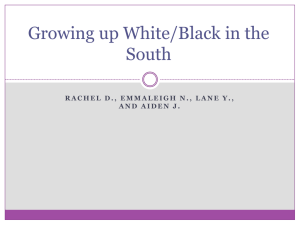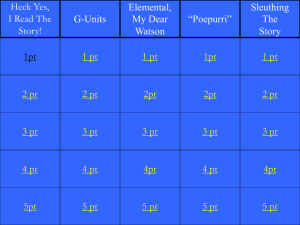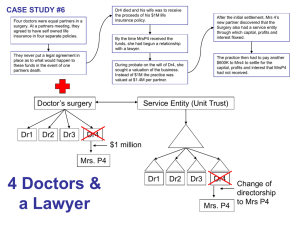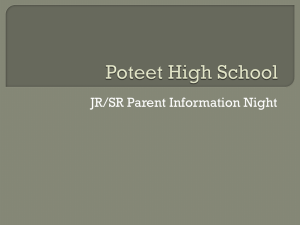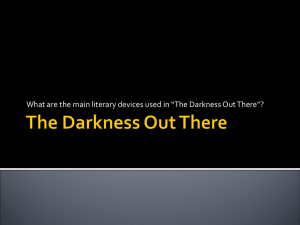Blood Brothers - Saddleworth School
advertisement
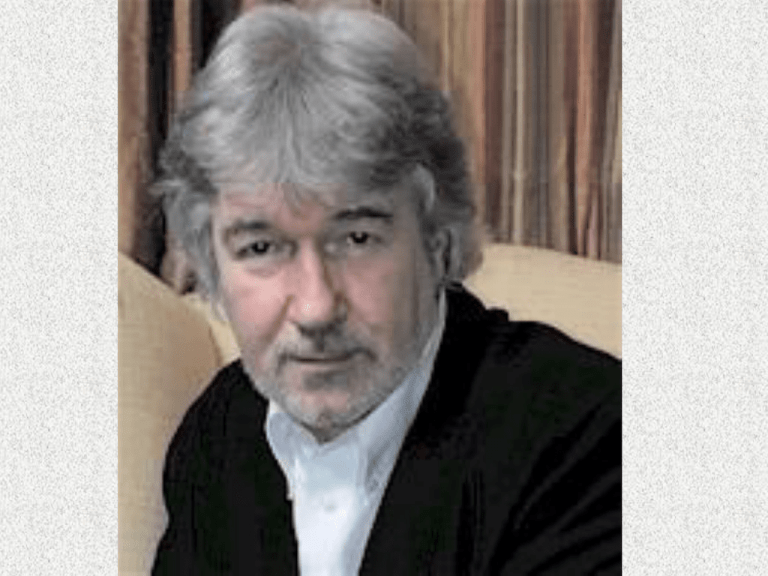
Willy Russell was born just after the Second World War (1947) in
Whiston on the edge of Liverpool. He was born into a workingclass family and environment that was to shape much of his
development and literary work. Like Arthur Miller, another
playwright with a working-class background, he would also draw
on his childhood and early adult experiences for the subject
matter of his work.
Russell did not perform particularly well at school and there was
no clear indication of a literary career ahead — although Russell
does admit he enjoyed reading, and apparently thought about this
as an occupation at a young age.
Russell ended up becoming a ladies’ hairdresser, and running his
own hair salon. Sound familiar? Although he found this unfulfilling,
it gave him time to read and write (much like Rita’s situation).
Eventually he returned to studying and he did ‘O’ level English
Literature at night school, and finally saved up enough money to
study at college full-time. As you can see, there is a great deal of
similarity between Rita’s and Russell’s own life experiences.
Russell has written a number of acclaimed plays, including Blood
Brothers (1981), and Shirley Valentine (1986), which, like
Educating Rita, has been turned into a film.
Marilyn
Monroe
Marilyn Monroe
Intro – explain who she was – link to BB
Para 2 – References in songs – positive
Para 3 – other references – negative
Para 4 – Similarities between her life and those of
characters in BB
Para 5 – why has WR used her: effect of lack of love,
tragedy, ambiguous circs of death.
1 Introduction
One of legendary icons in history – a lifestyle which others
could only dream of: success, beauty and glamour;
should have been one of the happiest people alive, but had
severe emotional and mental problems – like M and Mrs L.
mention at the beginning of the play forewarns the audience
that the tale will end in tragedy
born to single mother who couldn’t cope
lived with foster parents
married three times but no children; great need to be loved
drug dependency and addiction
questions about the way she died
2 Songs
Mentioned at beginning of both acts – mostly positively, but
symbolises how lives can turn sour.
Music 2 (p1) – prominent influence on Mrs J’s life – compared with
her in chorus, symbolises dreams of better times, a change in
her life, hope for the future, but with jarring note when husband
goes off with another woman who “looks a bit like MM”.
3 other references – negative
Music 20 (p27) – although generally positive in tone, ominous
note when she hopes Edward will be “OK / Not like Marilyn
Monroe.”
Music 35 (p62) – tone turned negative: references to MM’s
later life – “jail’s sent him off the rails…he treats his ills
with daily pills…You’d think he was dead / Like Marilyn
Monroe” - hints at an early death.
4 Similarities to characters in the book:
all want more out of life
Mrs J - looks, deserted by husband, suffers tragedy in life
Mrs L – no children, MM’s mother had mental problems like
Mrs L
Eddie – brought up by foster parents
Mickey – behaves according to type (working class) as did
MM (dizzy blonde), drug dependency
5 Why has WR used her:
Shows how lack of love & biological parenting can have
profound and lasting effect
Seems to follow Mrs J throughout life, so we have a sense of
inevitability of a tragic outcome.
Symbolises hope and people’s expectations, but also
tragedy: reprises of MM theme depict the rise and fall of
the lady herself.
Ambiguous circumstances of MM’s death echoed in death of
M and E – was it superstition or class? Left open to
personal interpretation, as is death of MM.
Superstition
Intro – mention narrator’s words at end of play
Para 2 – Mrs Johnstone
Para 3 – Mrs Lyons
Para 4 – Other characters (children, E and M
mingle blood)
Para 5 – Narrator
Conclusion – your thoughts?
At the end of the play, the narrator gives us the choice:
“Do we blame superstition for what came to pass?
Or could it be what we the English have come to know as class?”
There is certainly a lot of superstition mentioned in the play, and it
may be Mrs J’s superstitious nature which eventually causes the
death of her two sons.
Mrs Johnstone despite her protestations,
“I’m not superstitious”
introduces superstition when Mrs L puts new shoes on the table:
”You never know what’ll happen”
Mrs L picks up on this weakness and makes sure of Mrs J’s
silence by introducing/making up one of her own, that
“twins, secretly parted…if either twin learns that he was one
of a pair, they shall both immediately die.”
Mrs’s J’s strong beliefs perhaps link with her religion, being a
strong Catholic, which is why Mrs L makes doubly sure she will
never tell their secret by making her swear on the Bible:
“in the name of Jesus the thing was done”
but this is made to sound evil by introducing the words
“There’s a pact been sealed there’s a deal been born”
Later in Act 1 it is the sceptical Mrs Lyons, whose character is
beginning to break down, who shows superstitious reactions when
(she rushes to the table and sweeps the shoes off)
In Act 2 it seems she is beginning to believe the superstitions she
shunned: the narrator asks if she believed she was free
“from the broken looking glass”
when she visits Mrs J, she has finally broken down: she shouts,
“I curse you! Witch!”
The last time we see her is a brief, non-speaking, but vitally
important scene, when, as if to finally break the hold M has over
E, she believes her own superstition and
(turns M around and points out Edward and Linda to him);
this is the catalyst for the tragedy at the end.
Other characters join in with the superstitions:
M and E mingle blood to become blood brothers; suggesting that
sharing blood will strengthen their bond
All the children are superstitious, believing that
“if you cross your fingers and count from one to ten
You can get up off the ground again,”
a belief which is wished for in Act 2 by the narrator:
“Maybe if you counted to ten and kept your fingers crossed
It would all be just a game and no one would have lost.”
Mrs J tells E to go home
“before the bogeyman gets you”,
a superstition which is scoffed at by Mrs L –
“the sort of thing a silly mother might say to her children”
The Narrator is character who draws our attention to superstition
and keeps referring to it:
It begins when Mrs L puts
“shoes upon the table”
and each song adds new superstitions to the list:
“joker in the pack…the salt’s been spilled…looking glass
cracked…one lone magpie…walking on pavement cracks” –
the list of things to avoid seems endless;
the result of breaking the superstitions seems to be that
“The devil’s got your number”.
As the play progresses, the devil becomes closer and closer, as
does the tragedy, until
“he’s callin’ your number up today”, when the debt
“must be paid”
Yet he is the one who casts doubt upon superstition as the
reason for the events:
“or could it be what we, the English, have come to know as
class”
Your thoughts?
Class
Intro – mention historical setting: Liverpool, Thatcherism,
class divisions
Para 2 – set design
Para 3 – deprivation of working class
Para 4 – attitudes – scene with policeman
Para 5 – education
Conclusion – effect of class on lives of M and E – M’s dying
words
1 BB is a musical set in Liverpool in Thatcher-run England; it
examines the social divisions at the time by showing the lives of
twins born to working-class Mrs J, one of whom is given away
to middle-class Mrs L who cannot have children; therefore any
differences are going to result from the way they are brought
up: nurture, not nature.
2 Symbolically seen in set design: one half of stage is always M’s
home, the other E’s: opposite poles; contrast evident especially
in first act in run-down, dilapidated houses where there is a lot
of crime on L of stage and “big” more expensive homes “up in
the park” on right, but still evident in newer but cheap-looking
council homes in Act 2.
3 Deprivation of working classes focused on in opening scenes:
with “seven hungry mouths to feed” she can only dream of
“ham, an’ jam, an’ spam”; she’s “dead worried about havin’
another baby” and knows that kids “can’t live on love alone” and
has to buy everything on “easy terms” although it soon has to
be re-possessed. Contrast with Mrs L’s lifestyle seen
throughout song “My Child” where she dreams of Eddie living in
a “palace” and not having to “worry where his next meal was
coming from”.
4 Division is most apparent in the scene with the policeman in Act
1 - to Mrs L: “more of a prank” to Mrs J “a serious crime”, even
though it was E who was cheeky to the policemen! (Due to
social class: Lyons family have more money and thus more
power; indicates how people are judged by class and how M
and E are likely to be treated later in life) (examine difference in
policemen’s attitude to two families here in detail)
5 Differences in education is also significant: in Act 1 we see the
differences in language between M and E: M swears, using the
“F-word”; E says he will “look it up in the dictionary” – M doesn’t
know what that is! M, however, is more street-wise and can
teach E lessons about life.
In Act 2: two successive scenes: one in state school, one in
private school – develop contrasts. E: “Talk of Oxbridge”; M:
“when you can’t get a job”.
Prospects? E: “Why is a job so important? I’ve got money, lots of
it.” Gets a good job on the city council and has money and
power M suspended from school, starts work in a factory, laid
off then unemployed: “after being fucked off from everywhere, it
seems like it was paradise.”
6 Throughout, we see the effect that class on the lives of M and
E. At beginning, both boys envy each other, seen in the song
“My Guy”. By the end M’s situation is so bleak that E can only
pity him, but M’s final words show how he still wishes he “could
have been him”. Nearly every character is a victim, whether
working class, preferring a more secure, luxurious lifestyle, or
middle class, preferring a more relaxed lifestyle. Russell
comments on this and even hints that this may be the cause of
what happens at the end of the play – “Could it be what we, the
English, know as class?” – Your view?
Violence
Intro – overview of progression of violence
Para 2 – children’s games – song;
other references to toy guns in Act 1
Para 3 – guns in Act 2 uniting three characters
Para 4 – escalation of violence in Act 2: incidents
involving Sammy, Mrs Lyons with knife
Conclusion – final scene
1 Despite Willy Russell’s comments that he’s “not convinced that
banning toy guns will do anything towards curbing the
aggression in children”, there seems a definite progression in
the play from childish games involving mock violence to the
violence of adult life, leading eventually to the fatal shooting of
both the brothers.
2 We first see the children playing in Act 1, where there is a
fantasy scene: the friends begin with a game of cowboys and
Indians; gradually the carnage grows to a vaster scale where
guns become bombs and more and more people are killed. Of
course, no one is killed in reality because “you know that if you
cross your fingers /and if you count from one to ten /you can
getup off the ground again/ it doesn’t matter/ the whole thing’s
just a game.” (p23)
3 Toy guns dominate the lives of the children in Act 1: when we
first meet Sammy he is wielding a toy gun (p18); M’s first
interchange with his brother involves the theft of his “best” gun
(p19) and ironically, when E arrives home his father presents
him with a toy gun, at which Edward is “delighted” (p20).
Another irony is that for his parting gift, E gives M a toy gun,
(p32) perhaps, in retrospect, an ominous omen. Even Linda is
involved in the games with guns: in addition to the “Kids Game”,
she is the one who always manages to hit the target when they
“shoot the little thingy” off the statue in the park with Sammy’s
air rifle. (p26) (M never was a very good shot)
4 In Act 2, the violence soon escalates. There two brief
references to the way that shooting unites the three friends: in
the “Light Romance” when E mimes shooting at the statute
(p66), reminding us of their innocent friendship in Act 1; and in
the fairground scene, where Linda again triumphs (p52),
perhaps this time preparing the audience for the way in which
guns are going to separate them. In addition, there are two
incidents involving knives: the scene on the bus where Sammy
threatens the conductor, and the unexpected attempt on Mrs
Johnstone’s life by a deranged Mrs Lyons.
5 Sammy’s armed raid on the bus with a knife (p40) is a
precursor for the armed robbery which leads to M’s
incarceration. Sammy kills in the second armed robbery (p62);
in a contrast to the fantasy sequence, the narrator points out
that “maybe if you counted to ten and kept your fingers crossed
/ It would all be just a game and then no one would have lost.”
(p62)
6 This all builds up to the final scene, one of carnage:
Mickey’s ineptness with guns results in him accidentally
“blow{ing] Edward apart” when he waves the gun in his
direction (NB it is the gun which “explodes”, not M who
shoots); he even confesses: “I was gonna shoot y’. But I
can’t even do that. I don’t even know if the thing’s loaded.”
(p69). In his turn M is also “blown away” by the police when
four of their guns “explode”: this violent image is the last we
see before narrator’s final comment and Mrs J’s moving “Tell
me it’s not true”.
7 Your views?
Dreams
Intro – contrast with real life, effect?
Para 2 – Marilyn Monroe
Para 3 – maternal dreams
Para 4 – most of characters want someone else’s life
Para 5 - dreams of future almost always dashed
Conclusion – all dreams become unreachable
1Introduction
Most of characters have unfulfilled dreams which
contrast with the stark reality of life.
Most don’t come true – feeling of hopelessness: “living
on the never, never” and the “price you’ll have to pay”.
Audience’s hope is increase by dreams which throws
tragedy of ending into greater relief.
2 Marilyn Monroe
ideal figure: women want to be like her; yet tragic ending
both milkman and judge indulge in fantasies about her;
emphasised by repetition of song (one of first and last) with
mood changes from positive to negative:
“You’d think he was dead / Like Marilyn Monroe”
links to Edward:
“I’d know some real birds / Apart from those in my dreams”
3 Maternal dreams shared by Mrs J and Mrs L:
both wish E was their son; each has dreams for his future: “a
credit to me”
Song acts as a soliloquy for both mothers to show real
feelings, “I’ve dreamed of all the places.”
but develops a sinister note after narrator’s comment:
“There’s a pact been sealed, there’s a deal been born.”
4 Most of the characters want someone else’s lives:
Mrs J wants a better life: “We’ll live like kings…like Marilyn
Monroe”
Mrs L covets Mrs J’s children: ”We’ve been trying for such a
long time now”
M wants to be grown up like his brother: “I wish I was our
Sammy”;
ironically, when he’s older, he wishes he were younger!
E and M reflect on their own bad features and each other’s
good qualities; “I wish that I could be like…that guy” - ironic
E envies M’s relationship with Linda seen in song “if I was that
guy”
M jealous of E: “You’re still a kid. An’ I wish I could be as well,
Eddie”
The embodiment of all the unreachable hopes and dreams are
found in M’s last words: ”I could have been him!”
he resents his working class roots and wanted the same
opportunities as E; he blames all his lost dreams on class – but
5 Dreams of future almost always dashed; there’s always a price
to pay and the life they want is always out of reach:
Mrs J’s seen in song ”Bright New Day”: “where we can begin
again”
Mr Lyons makes empty promises: “I will, I promise you, have
more time”.
Mickey’s relationship with E: “The Christmas party’s gonna be
on me”
E’s with M: “I thought we always stuck together”
Linda: “Isn’t it great? If he’s workin’ an’ we’ve got our own place
he’ll be able to get himself together an’ stop takin’ those friggin’
things…”
Linda: “The girl would sing the melody but the woman stands in
doubt / And wonders what the price would be for letting the
young girl out”
6 All dreams become unreachable, or reachable only with a price
hopes that they were possible sent many (Mickey, Mrs L, Mrs J,
Linda) into madness and frustration.
It was Mrs L’s one dream to have a child and Mrs J’s dream to
give one child an opportunity in life that led to the spiral of
events ending in E and M’s deaths.
Dancing
Intro – what is the general effect?
Para 2 – expression of happiness in acts 1 and 2
Para 3 – sign of growing maturity
Para 4 – negative connotations
Conclusion – changes, as do several other aspects,
including M and E’s relationship
1 Dancing is one of main themes of play and runs parallel to the
storyline. It appears many times throughout the musical, often
linking Mrs J and Marilyn Monroe, a screen idol of the time,
suggesting the former’s dreams of better times. It is often used
as an expression of happiness and a metaphor for life, but also
has other meanings, suggesting nostalgia and sadness and
becomes sinister towards the end of Act 2.
2 Play opens with joyful theme of dancing – this is how she met
her husband, suggesting happiness (“We went dancing”), but
she also lost her husband when she was pregnant and “twice
the size” of MM. When Mrs J learns that she is to be rehoused, she responds by dancing with the picture of the Pope
(p36)
3 The beginning of Act 2 echoes the opening of the play, as Mrs J
finds happiness again, this time dancing with the milkman,
because she is able to pay her bills. Even the judge in Sammy’s
trial offers to take her dancing, perhaps trying to regain his lost
youthful happiness!
4 It is also a sign of growing maturity: M and E have begun to
dance in their own style, showing that they too have begun to
grow up (p38) (NB E is dancing awkwardly, perhaps suggesting
that there is tension between himself and his mother). This is
also seen on p50 when M and E have been to see the adult
movies, a rite of passage, and E grabs Linda’s friend and
begins to dance.
5 However, later the symbolism of dancing takes on negative
connotations. Things begin to go sour for M when he is coerced
into helping Sammy with the robbery in order to take Linda
dancing (p61). He begins to lose control of his life when he
takes the pills given by the prison doctor to control his
depression. This lack of control is conveyed by the metaphor
describing how his mind’s “gone dancing” (p63), just like he
can’t control the events that are about to unfold and the final
scene here he shoots E. Dancing here has negative
connotations, it shows an escape from reality, which eventually
leads to madness. At the same time, dancing is used to show
how Linda finally seems to be gaining happiness after all the
pain when Mrs J describes how she and E “dance as friends”,
reflecting the good times they had when they were younger.
6 In conclusion the theme of dancing is used mostly to convey
feelings of happiness. However, Willy Russell also uses it subtly
as a way to express sorrow and sadness. He has turned a
happy activity into something quite the opposite. This reflects
the way he turned M and E’s innocent childhood friendship into
a hatred (on M’s part) that resulted in their deaths.
Who do you feel more sympathy for, Mickey or Eddie?
1
Throughout the play we see two boys who share the same
genes, growing up in the same town, but having two totally
different experiences because of their class. Although Mickey and
Eddie are twins, their upbringing made them turn out as two very
different people. At the end of the play, Russell brings the two
brothers together so we can see the differences between them,
how successful Eddie has become and how everything has gone
wrong for Mickey because of his class.
Mickey
We can feel sorry for Mickey because:
his mother could never afford anything “seven hungry mouths
to feed”
his older brother used to steal the toys that he did have “our
Sammy’s robbed me other gun”
he was bullied by his brother
his family were treated badly by tradesmen and police
because of their poverty
as he got older, things got worse – he lost his job and had no
money, so was forced to help Sammy on the robbery and was
“sent down for seven years”
he couldn’t handle prison life and had to take antidepressants: “his mind’s gone dancing”
Mickey is jealous of Eddie because he has an easier life. At
the end before he dies, he says “how come you got everything
and I got nothin’ “
His last words are “I coulda been him!”
However:
He has the love of a mother who “loves the bones” of everyone of
her children and won’t give them up for anything.
He has the love of Linda who stays by him through thick and thin.
“I love y’ Mickey an’ I don’t care who knows”
Eddie
We can feel sorry for Eddie because:
although he has every material thing he could wish for, he has
no friends until he meets Mickey: “Will you be my blood brother?”
he envies Mickey because he says “smashing things” and is
allowed to run around with “dirty knees” – he is rarely let out of his
mother’s sight
he envies Mickey his mother “She’s smashing, your ma”
whereas his own mother is known as “the mad woman who
lives on the hill”
he also loves Linda, but holds back because he knows that she
belongs to Mickey: “But I’m not saying a word”
he even selflessly (and painfully) brings the two together
although he is very successful, going to university and having a
position on the council, he still envies Mickey because he has the
love of Linda.
However:
He has every material want catered for, and even says he
wouldn’t care if he had no money.
He has the advantage of a private and university education and a
well-paid, influential job.
Overall, you can feel sorry for both Mickey and Eddie in
different ways. It is ironic that Mickey is jealous of Eddie because
of his material possessions and Eddie is jealous of Mickey
because of relationships with his mother and with Linda. They
both wish they were the other.
“If I was him…”
At the end of the play, Mickey is probably the one we feel
most sympathy for because everything has gone wrong for him;
however, Eddie’s life wasn’t perfect either.
Who is to blame for the deaths of Mickey and Eddie?
Mrs Johnstone
Sammy
Linda
Edward
Mickey
Who is to
blame?
Mrs Lyons
Mr Lyons
Mrs Johnstone
gave Edward away so that she could keep her other children
swore an oath on the Bible that she would never tell Edward
that she was his biological mother – but broke that oath when
Mickey was threatening to kill his brother
“Nobody must ever know”
Linda
rekindled her friendship with Edward when her marriage with
Mickey was going through a rough patch
“She turns Mickey round and points out Linda and Eddie to him”
when Mrs Lyons showed him the two together, this gave
Mickey more reason to hate Edward, even doubting whether
Sarah was really his
“First it was just ciggies, now it’s a house.”
Mrs Lyons
persuaded Mrs Johnstone to give her son away
used promises and threats and superstition maliciously to make
the reluctant mother part with one of her sons
caused the final rage in Mickey by pointing out the closeness of
Linda and Eddie
Mr Lyons
by refusing to adopt, made his lonely wife so desperate that she
resorted to subterfuge to persuade Mrs Johnstone to part with one
of her sons
his commitment to his work meant that he was never there ofr
Edward or his wife, and failed to see the mental problems his wife
was having
His obsession with keeping costs down cost Mickey his job and
was the reason why Mickey agreed to take part in the robbery
Sammy
bullies his younger brother and sets a bad example, almost
forcing him to take part in the robbery
this results in the jail sentence which sends Mickey off the rails,
making him dependent on pills, which in turn affects his marriage
the owner of the gun which kills Eddie – Mickey knows where it
is kept
Edward
lack of sensitivity towards Mickey (by not understanding that his
offers were a blow to Mickey’s pride) causes resentment and
jealousy
“Look! Look! Money, lots of it! Have some!”
his attempts to comfort Linda when her marriage was in trouble
lead to the final showdown
Mickey
His addiction to pills causes the rift between himself and Linda
“Give me me tablets. I need them.”
It also clouds his judgement and results in the paranoia about
Edward and Linda
It causes him to act impetuously and take the gun when he is
angry, unaware of what he is doing
Overall, each of these characters is in some way
responsible for the deaths of Mickey and Eddie. However, some
are more guilty than others. After reviewing all the influences, I
believe the character who appears mostly to blame is Mrs Lyons,
who was the originator of the plan to separate the twins and the
one who swore Mrs Johnstone to secrecy by preying on her
superstitious nature. She is also the one who ultimately caused
Mickey’s rage, making him jealous by showing him Linda with
Eddie.
How do the songs in “Blood Brothers”
contribute to an audience’s appreciation of
the play?
How to approach the question
Plan.
Begin by listing important songs (in order if possible).
What does each song add to the play?
Are there different purposes?
Are any repeated?
Which do you think is/are the most important?
Introduction:
“Blood Brothers” was originally written without music.
Why did Willy Russell decide to rewrite it adding songs?
There seem to be three main purposes: to give the audience
background information (as in “Marilyn Monroe”); to develop
our understanding of and empathy with characters by
revealing their thoughts and emotions (as in “My Child” / “My
Friend”/“That Guy”) which could not be conveyed in any other
way; and to create or develop a mood (as in “Shoes upon the
Table” and “Bright New Day”).
The first main song is “Marilyn Monroe” sung by Mrs
Johnstone at the beginning of the play. It explains Mrs
Johnstone’s life up to this point, how her husband took her
dancing until she became pregnant and was “twice the size of
Marilyn Monroe” and then left her “for a girl they said looked
a bit like Marilyn Monroe”, the comparison with the film star
showing what Mrs Johnstone would aspire to. The song is
reprised at the beginning of Act 2 to explain what has
happened since they moved to the country, how “Sammy burnt
the school down” and Mickey has started “dancing”. Later in
the act it occurs again to fill in details of what happened after
Mickey was apprehended by the police. The music which
accompanies this song changes, from a light, carefree mood at
the beginning, when Mrs Johnstone, despite her life of
misfortune, is happy and optimistic, to a more sombre, minor
key in Act 2 when she describes how Mickey isn’t coping with
life in jail.
The other recurring song is “Shoes upon the table” sung
by the narrator, especially when the characters, Mrs
Johnstone and Mrs Lyons, are becoming complacent about
their lives, to remind them that “the devil’s got your number”.
The lyrics remind the characters and the audience that there
is a price to be paid for the deal that was made between the
two women. They indicate that the moment of retribution is
nearing by changing from “he’s walking past your door” to “he’s
knocking at your door”. Both the lyrics and music deliberately
sound sinister, changing the mood and building the tension and
suspense. Contrastingly, another song, “Bright New Day”,
creates a happy mood, revealing the optimism felt by Mrs
Johnstone now that she can “begin again” and start afresh
when they are rehoused in the country.
Some song lyrics are repeated to create a contrast, for
example, the “Kids’ Games” song has the refrain that if you
cross your fingers and count from one to ten you can get up
off the ground again: the whole thing’s just a game, revealing
their naïve approach to guns; whereas at the end of Act 2 the
narrator reminds them that they can’t get up again.
Other songs reveal the thoughts of the characters and
help the audience to empathise with them. “My Child”, sung by
both Mrs Johnstone and Mrs Lyons, reveals their shared
yearning for a child which will grow up in a secure and loving
environment, having everything that it could possibly want –
including a “bike with both wheels on!” Ironically, the same
tune is used for the two songs sung by Mickey and Eddie: “My
Friend” and “That Guy” which both reveal how the boys envy
each other’s looks and lifestyles! “Look at his hair; it’s long and
wavy…mine’s the colour of gravy”; whilst Edward wishes he was
Mickey and knew “some real birds”, Mickey wishes he was
Edward so that he knew the “right words”. Perhaps Mrs Lyons
took the wrong baby! This is emphasised at the end when
Mickey shouts out: “I could have been him!”
The final song in the play is Mrs Johnstone’s “Tell me
it’s not true”, a couple of lines of which were sung at the
opening of the play, thus creating a link. However, this final
version is much more powerful as the music emphasises the
solemn mood, the disbelief and mourning over the sudden
deaths of her two sons. The slow tempo and quiet volume
create an atmosphere of depression amongst the characters.
The lyrics “say it isn’t so; say I’m only dreaming” emphasise
how shocked and dismayed Mrs Johnstone is. This song
relieves the dramatic build-up towards the shooting and
replaces the tension with a solemn note. It is more powerful
and would draw more sympathy from an audience than a mere
speech would. The way the rest of the cast join in with the
final chorus underlines the sorrow.
The songs are extremely important as they intensify
emotion through the music, and express the characters’ true
feelings, which could not be done though normal speech alone.
They are a good way of setting and changing the mood and
atmosphere, as well as an effective way of giving the audience
information about the story.
How does Willie Russell make the ending of
the play, from when Linda telephones Eddie,
dramatic and moving?
How to approach the question
Plan.
Begin by listing main events (in order).
phone call and Narrator’s song – sympathy for L
M with pills; L betrayal with E – sympathy for M
Mrs L telling M about L and E – tension
M’s reaction (gun); “Madman” song – tension mounts
Interchange between E and M; deaths – climax
Mrs J’s song – sombre mood to end
How does WR make each event dramatic/moving?
What is your response at the end?
Willy Russell effectively builds up the tension and
drama in the last few scenes of the play. From the moment
when Linda betrays Mickey to the final showdown, when both
brothers lie dead.
Firstly the audience sees Linda phoning Eddie,
desperate for someone who understands to talk to. Whilst
she is on the phone, the narrator describes the person she has
become: “She’s washed a million dishes and she’s always making
tea.” Like Mrs Johnstone, she has become old before her time,
caring for her husband and child and missing out on the fun
she should be having as a teenager. Not only this, but her
husband is no longer there for her, havng chosen the pills and
invisibility over his wife and family: like Mr Johnstone, he has
chosen to leave her, even though only in mind, not body. This
engages the audience’s concern and sympathy.
The spotlight is on Linda and Edward now, as Mrs
Johnstone sings “Light Romance”. In the background, we see
Mickey struggling to do what Linda has asked: to stop taking
the pills. We see his determination, and at the same time we
see Linda and his best friend betraying him. This has a huge
effect on the audience, making them feel moved at Mickey’s
efforts, but also frustrated by Linda’s terrible mistake.
The audience is then astonished when Mrs Lyons
appears, apparently telling Mickey about Linda and Edward.
This makes them feel sympathy for Mickey, but at the same
time, tension is created, and concern at what Mickey’s reaction
will be, considering the last exchange with Edward and his
unstable state of mind, under the influence of the prescribed
medication.
The music dramatically changes from Mrs Johnstone’s
soft, gentle lyrics and tune to the Narrator’s “Madman” song,
with its loud and violent tune and insistent lyrics which
prepare us for a reckless response. The repeated refrain
continues as we see Mickey grab Sammy’s gun and dash off
stage – obviously in search of him. The tension mounts: what
will happen ?
The scene in the council chamber is the climax of the
play, made even more tense and exciting by the appearance of
actors (Mrs Johnstone and the police) in the auditorium.
Finally, the dialogue between Mickey and Edward has the
greatest, moving impact on the audience, as we see Mickey
waving a gun at Eddie and doubting his loyalty as a friend.
“You and Linda were friends when Linda got pregnant, weren’t
ya?” The audience feel the anger generated by Mickey and
fear for Edward’s life
Then the atmosphere seems to calm as Mrs Johnstone,
ever the calming influence on her son, walks down the aisle.
However, she makes the fatal mistake of tell her sons the
truth about their parentage: Don’t shoot Eddie; he’s your
brother!” The reaction we anticipate does not occur, however,
and we see Mickey respond in a completely unexpected way:
“Why didn’t you give me away?” We feel a huge amount of
sympathy for both Mrs Johnstone and Mickey, but in the
same moment, as you are recovering from this twist, Mickey’s
“I could have been him!” and accompanying gesture results in
the gun “exploding” in his hand and killing his brother. Before
you have time to register this, shots are fired from the
auditorium, creating even more drama.
The shock you feel is quickly followed by sadness as Mrs
Johnstone sings the slow, sad, ironic “Tell me it’s not true”.
The whole cast joins in on the last verse, which could
symbolise that they all feel upset about what has happened, or
perhaps they all feel they had a part in what happened. It
leaves you feeling extremely moved.
Childhood and Adolescence
Through Russell’s depiction of childhood in Blood Brothers, we
witness two brothers experience very different upbringings.
The contrast between the two brothers, who meet and become
friends, brings humour to the first half of the performance.
Eddie seems to have suffered from a lack of childhood, as
even when we first meet him as a child, he is very adult in his
mannerisms and is polite and contained. We sense that Mrs
Lyons has been overprotective and has not allowed her young
son to interact with other children in messy, noisy childhood
games. So it is with awe that Eddie learns from Mickey who is
totally untamed; whilst Eddie rides his imaginary horse with
the graceful air of a dignitary, Mickey’s horse is wild and
foaming at the mouth.
In Blood Brothers Russell explores the ideas of fate and
destiny and creates dramatic irony through the audience’s
foreknowledge of the twins’ grim fate, whilst the brothers
remain ignorant of their demise. This accentuates the sense of
childhood innocence in the first half of the performance. We
see Mickey and Eddie indulge in childhood games of gunfights,
which we find more poignant as we already foresee their
death-scene. This also brings a bitter taste of irony to
Mickey’s involvement in a shooting later in the play. This in
turn leads to his incarceration, depression and the desperation
in which he pulls a gun on his best friend and brother.
How much does the debate of Nature vs Nurture feature
in Russell’s depiction of the brothers?
Do we think that an individual’s identity is formed by the
process in which they are nurtured, or raised, or does Russell
suggest that heredity (nature) influences an individual’s
identity and ingrains a sense of belonging that runs back to
your roots? We see that Eddie has been nurtured into a wellspoken, middle-class boy, whereas his twin remains a workingclass ruffian. However, when Eddie returns to the Johnstone
household we see a change that suggests he is going back to
his roots. It is also possible to suggest that fate and heredity
are working together to bring the brothers back together.
The bond of their friendship disregards childhood fickleness
and has a true air of sincerity.
Social Class
We have already acknowledged the importance of social class
throughout the text, within the study of characters and their
relationships, identity, and the experience of social class
throughout childhood and adolescence. In Blood Brothers, we
see social class as a conflict, mirroring the battle between the
two mothers. We also see Mickey and Eddie overcoming the
class boundaries to secure a bond of friendship and affection.
On stage there are several indications of the class separation
that cannot be made as apparent in the text. For example, the
use of costume immediately causes us to make an assumption
about each character. Eddie appears with his clothes neatly
pressed – Mickey appears as if he has just been ‘dragged out
of a hedge backwards’.
On the stage, the accents can also be brought to life, again
reminding us of the conflict between the classes. Eddie and
the Lyons are well-spoken, traditional of the middle and higher
classes – suggesting a good education and elocution lessons.
The Johnstone family share a broad Liverpudlian accent,
suggesting the lack of a ‘proper’ education and implying a
Surrogate Parenthood
Again, we encounter the idea of ‘Nature or Nurture?’ Mrs
Lyons tries her best to make Eddie her own, bringing him up
the way she desires; however, Eddie still finds his way back to
his roots. Mrs Lyons suffers a dreadful insecurity as a
consequence of this, revealing herself as an obsessive and
quite aggressive character.
Throughout the play we view the idea of surrogacy as a
dangerous concept. We see from the very beginning that Mrs
Johnstone is reluctant to give away her own child, and in turn
we witness Mrs Lyons’ manipulative nature as she coerces Mrs
Johnstone into parting with her son. We know from the
beginning that Mickey and Eddie’s separation is going to end in
tragedy, so we always foresee their parting as a bad idea.
Despite this, we are encouraged to question the ethic and
moral issues surrounding the idea of surrogacy.
Superstition
The superstition imposed upon the play by Mrs Lyons – that
should either Mickey or Eddie discover that they are one of a
pair, they both will die – becomes a self-fulfilling prophecy –
we are reminded constantly of this curse by the Narrator’s
repetition of the song, ‘Shoes Upon the Table’. How does the
theme of superstition affect the pace of the text/play?
Social Class
In this country, class effects how people are
able to live their lives and the situations they
are in.
In 'Blood Brothers' Mrs Johnstone lives in a
poor end of Liverpool, struggling to bring up
eight children on her own and is forced to give
one away to keep the others clothed and fed
well enough, whereas Mrs Lyons, whom she
works for, lives in a large house, very
comfortably in a nice part of Liverpool, she
wants children but is unable to have any, even
though she is rich, unlike Mrs Johnstone.
Love and Superstition
Love is a theme, shown by the two women
who love their sons but show it in completely
different ways. Along with superstition, this is
is the basis of the whole story and is a theme
that continues throughout the whole play, the
consequences of most of the happenings can be
traced back to superstition.
It is also the reason for the tragic end of the
play.
Friendship
There's also the theme of friendship, linked
between Mickey, Eddie and Linda and how they
are all friends, but it gradually brakes apart,
Mickey and Linda's friendship develops into
love, and Mickey and Eddie's friendship firstly
breaks up when Eddie is forced to move away
by his parents, then again later in the play
when Mickey becomes depressed he begins to
become jealous of Eddie, again leading up to
the tragic consequences. Hate then becomes
part of the play, as Mrs Lyons comes to
despise Mrs Johnstone because of the
situation both women are in with the twins.
Guilt
Mrs Johnstone is fulfilled with the theme of
guilt through out most of the play because of
giving her son Edward away to Mrs Lyons, but
also Mrs Lyons feels guilt because she has lied
to everyone about Edward being her own son,
she lied to her husband, friends, family and
even Edward himself. Mickey also becomes to
feeling guilt because he is so depressed he
cannot support himself or his family (Linda and
their child) and he has to rely on Linda and Mrs
Johnstone to actually support him.
How does Russell create an awareness of social, historical
and cultural contexts and influences in the text?
Russell uses the iconic status of Marilyn Monroe as a kind of
timeline that parallels the rise and fall of events. At the
beginning of the play, Mrs Johnstone is younger and as yet
without an extensive family; she compares herself to the
young rising star of Marilyn Monroe. Towards the end of the
performance, Marilyn Monroe’s demise reflects the sad change
in events within the play. The reference to Marilyn Monroe
also suggests an era for the play – the late 1950s, early 1960s.
This helps us to become familiar with the text and the play, as
we already have a knowledge of the era. This means we can
also gain an understanding of the stigma and boundaries that
surrounded the social classes at that time.
We must also take into account the economic climate of the
time – in the second half of the performance, Russell targets
unemployment. Liverpool has been home to one of the highest
levels of unemployment in the developed world, with over 25%
of the workforce out of a job, and it is important to consider
this when discussing Russell’s depiction and own views of class
and unemployment. Of course, it is vital to remember that
Willy Russell is a Liverpudlian himself, and his experience of
the social, historical and cultural high and low points will be
firsthand. It is with this knowledge that he creates a gritty
depiction of ‘real life’ in the city of Liverpool. With this in
mind, look at how Russell views class. What does Blood
Brothers tell us about these views? Consider the fact that we
have already discussed conflict within the text.
Russell, despite being male, does not show great support of
the father figures within Blood Brothers and instead shows
more sympathy for the role of motherhood and the notions of
tenderness and nurturing. Mr Lyons plays a relatively small
part in the show, often away on business, whilst Mr Johnstone
appears at the beginning of the performance as a womaniser
who leaves Mrs Johnstone in the lurch with children in tow. In
regard to parenthood and brotherhood, can we assume that
Russell views the bond of brotherhood to be inseparable, and
that nature and truth will out?
Final thoughts…
Some texts will provoke the reader to question or challenge
their own attitudes and assumptions – for instance, To Kill a
Mockingbird questions racist attitudes. In the present day,
prejudices towards race, class and gender are not widely
accepted – however we can understand that this was not the
case, even in our recent past. We are not as restrained by
class boundaries in modern society, but we can still understand
the conflict of the different social classes. Through Blood
Brothers Russell encourages us to challenge the assumption
that money = happiness. We sympathise with Mrs. Johnstone
and grow to understand that despite her background and lack
of money she is the better parent. This challenges any
assumptions that suggests wealth would afford a better,
happier upbringing.
Throughout Blood Brothers, the audience’s sympathy lies with
Mrs Johnstone – we know that she gives her own son away, but
we see that it is with good intentions, and despite her lack of
money and her numerous children, we feel she could give Eddie
a happier, more loving childhood.
